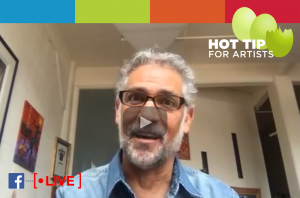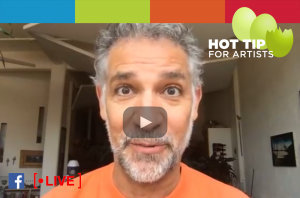Sort out your money stuff
Sort out your money stuffThe 7th in the series of 10 things I learned about running a successful arts business: Money!
Posted by Auspicious Arts Incubator on Monday, 17 September 2018
Sort out your money stuff
The 7th in the series of 10 things taking us through what JP’s learnt about running a successful arts business: Money!
Video Transcript
Right. So, here we are, live once again. This week, the point is to bring you up to speed with important thing number seven. So, this again is the series of “10 things that I learned to create successful arts businesses.” So over the years, I’ve created many, many successful arts businesses. And the idea of this is to give you these 10 things that I learned. So, they’re part of what I have in the book as the 10 parts that the book is divided into. So, this section of the book is called money and finance. And I think it’s an important section because once, if you follow all the things that I learned across the 10 things, you’re up to the point now where you’ve got a business that’s up and running, you’ve got customers, you’ve got products that you’re putting out into the world and money is starting to come in. And we feel really good that money is starting to come in, but also money is starting to go out. So, you’re at that point now where you’ve gotta start to measure the money coming in and the money going out and start to manage the money coming in and the money going out.
So, there’s a really important adage and I think that if I could tattoo something, you know, I don’t know if it’s a tattoo, but it certainly is something to post big on the wall and it says, “You can’t manage what you don’t measure,” right? “You can’t manage what you don’t measure.” And it’s true. The minute you start to measure something, you become consciously aware of it. And the minute you become consciously aware of it, your subconscious mind kicks into gear and starts to help you, right?
So, money is one of those things for us as artists that we would rather somebody else sort out, right? We’re like look, I’ve got lots of really incredible creative skills. My accountancy, my bookkeeping skills, not so good. And you kind of defer to someone else or, which was in my case, I ignored it. I did. I just ignored all the money stuff. Like, “No, I’m just gonna ignore that.” As a theater director, you know, you’ve got other people to manage this. And, you know, I ran a very large theater company. So, I did. I had bookkeepers on staff and I had a general manager and they could deal with all the money stuff. But here’s the thing. The minute things started to go really, really well and we had a surplus, it was up to me to figure out what to do with that surplus. And similarly, when things went into shit, it was back to the artistic director to figure out what we were gonna do to solve them. So, at some point, it’s all gonna come back to you. So, I think that getting on top of understanding the money is important.
So, this section of the book and these tips are gonna be divided into two tips. The first tip is about managing the money and the second tip is about finance and getting you to be a little bit more financial literate than you were before. So, if this idea of these hot tips is to be really, really quick, right? So, we’re gonna give you one challenge to work on this week and be really, really quick so that you can get on with making your art, but make a little bit of progress. So, I think if you understand this idea of needing to manage the money, I think let’s get on top of that.
So this week, what you’re gonna do is you’re gonna start to have a little expense diary. So, if you’ve never done that before, come on, let’s go. Let’s do it for this week. The real goal is you’re gonna do it for a month and then you’re gonna do it for three months. But let’s just be simple this week. And you’re gonna start to track every single dollar that goes out and every single dollar that comes in, right? So, you’re gonna create a diary. You can get an app if you want to do it on your phone, you can get a journal and write it down, however you wanna do it, do it in whatever way you’re gonna have success. If it means that you’ll be successful if you hand write it, do that. If it means you’re gonna be successful because you have an app on your phone, do that. Okay? There’s no right or wrong, just getting the diary done.
So, you’re gonna just write down every single dollar that goes out, so that you understand two things. One is, what does it cost you to be an independent artist, right? What does it cost you to make the work that you make this week? So, if you can, divide it into expenses into two columns, money that’s going out that’s personal. So, you know, lunch today, right? A coffee, a bottled water, whatever it is. And another column that says this is the money that’s going out for the business. So, if you have to top up your phone, if you have to pay a bill, if you have to go buy some materials or some supplies.
All right, so this week… sorry, a little bit of a frog in my throat today. This week, it’s about making an expense diary of every single dollar that goes out the door, and then also every dollar that comes in. So, you’re gonna have maybe two kinds of money coming in. You might have money that’s coming in from a day job, and you might have money that’s coming in from sales of your art, all right? So, again, try to differentiate between the personal money and the business money. And that’s what I want you to do for this week. Because what’s gonna happen, if you start to get ahold of this money and you start to manage your money, you’re gonna overcome the emotional triggers that we have around money. And we have them, right? So, there’s an emotional game that snares us as artists when it comes to the money and we ignore it. We pretend it doesn’t happen. We bury our head in the sand. Because we don’t want to have those feelings. But here’s the thing that I’ve learned. When you actually start to manage the money, when you actually start to measure the money, then you’re not a victim of the money. The money is just the tool, right? And you start to look at it, and you go, “Hmm, wow, I spent a lot this week on hmm” and you’re gonna make some adjustments and some changes.
So, the emotions that we have around money tend to be because of our ignorance, not our knowledge, okay? So, let’s get a little bit of experience. Let’s get a little bit of knowledge around the money. You’re gonna start to measure it. And the minute you start to measure it, I guarantee you it’s like almost on automatic pilot. You’re gonna start to manage it. All right, that’s what I want you to do.
Now, if this is really something that you need to get ahold of, maybe you need to jump into the ASAP program because the extended version of this hot tip takes you into a couple other things that you can do to try to manage the money. But for now, just let’s keep it simple and let’s try to achieve that. Okay?
Hello, Phil? Phil is a perfect example of the power of managing money. He’s on top of it. He’s learned that you have to be able to manage the money. He’s had a couple of creative businesses where the success of those businesses is because he started to manage the money and be aware of the money that was coming in and the money that was going out.
All right, so this hot tip was number seven in the list of 10 things that I learned that’s gonna make a successful arts business. So, seven and eight are money and finance. This has been number seven, managing the money.
All right, I’ll see you guys next week. And good to see you Mr. Phil. I sent you a package in the post. I hope you got it. Okay. See you all next week. Ciao for now.
Have you got our 4 Free Resources for artists?
webinar





0 Comments